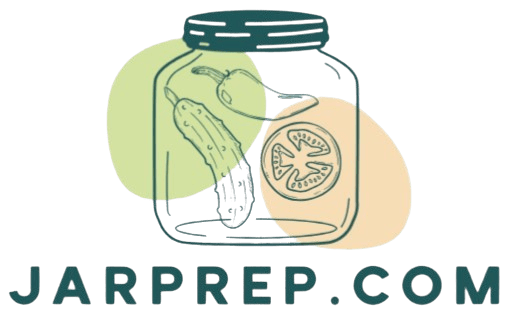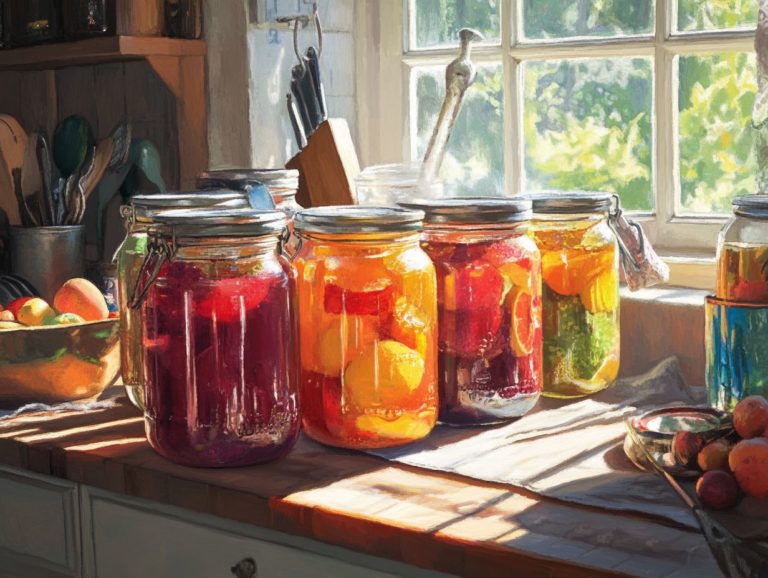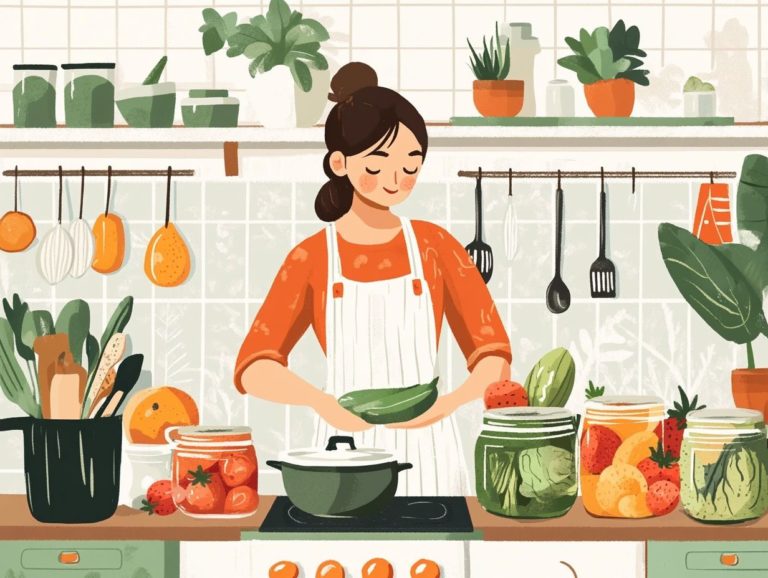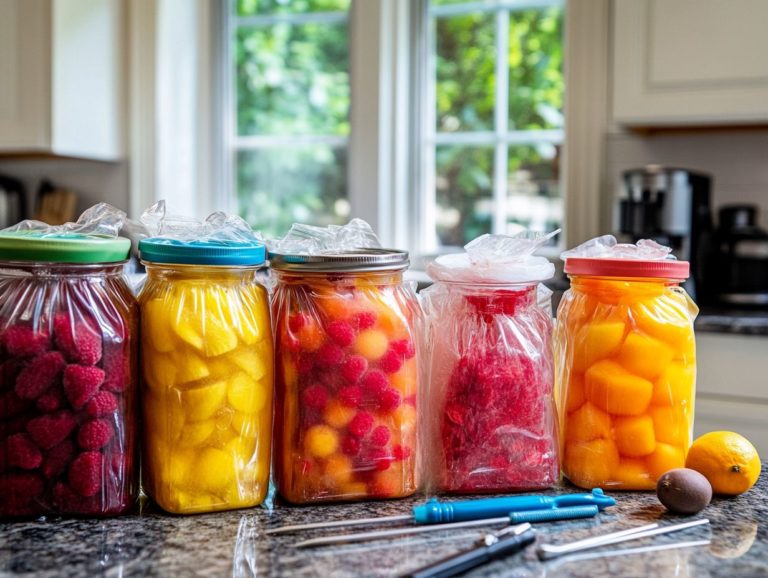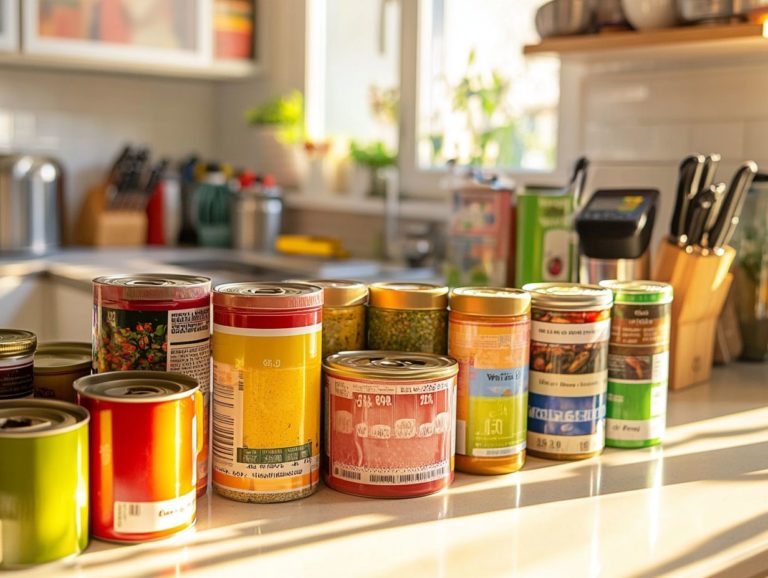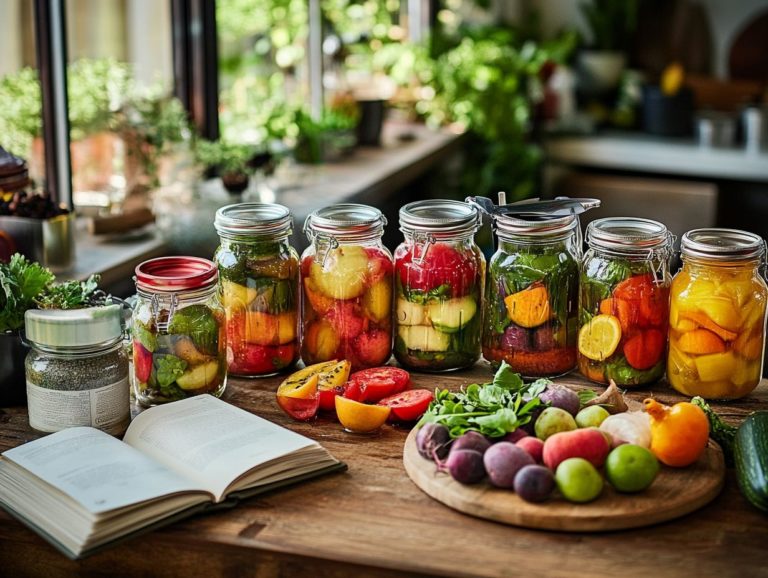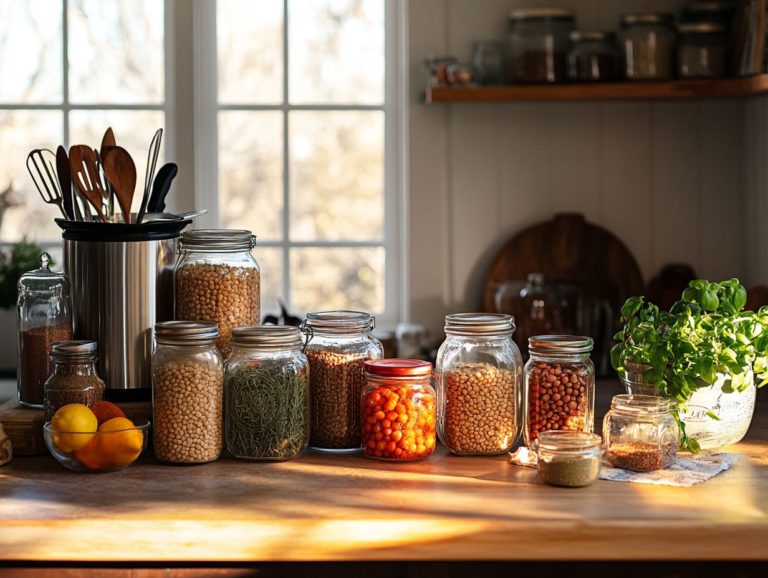What Materials Should I Avoid in Canning?
Canning is a well-known method of food preservation. It involves sealing food in jars and heating them to prevent spoilage, making it a popular choice for fruits and vegetables.
This great way allows you to savor seasonal fruits and vegetables all year round while also giving you control over the ingredients, ensuring that what you consume is fresh and safe.
Rooted deeply in tradition, home canning offers various methods, such as pressure canning and water bath canning, catering to a diverse range of foods from high-acid delights like pickles to low-acid staples like meats.
Each method comes with its own set of advantages. Pressure canning is important for low-acid foods, achieving the higher temperatures necessary to eliminate harmful bacteria, such as botulism. On the other hand, water bath canning shines with jams, jellies, and preserving projects involving high-acid ingredients.
Understanding canning safety is crucial. This includes learning about proper heat and cooking temperatures. It’s imperative to use sterilized jars and follow accurate time-temperature guidelines to thwart foodborne illnesses.
By employing proper food preservation techniques, you not only enhance the taste and quality of your home-canned goods but also significantly reduce food spoilage. This makes canning a truly rewarding endeavor for any home cook, especially when sharing with family and friends through canning tips.
Contents
Importance of Choosing the Right Materials
Choosing the appropriate materials for canning is necessary for guaranteeing both the safety and quality of your home-canned foods. This choice plays a significant role in food safety and the longevity of your preserved items, including how acidity content affects these factors.
Selecting the right canning equipment think jars with reliable seals and lids, along with suitable food ingredients can help prevent contamination and ensure that your canning methods are effective.
A comprehensive understanding of safe canning practices is crucial to avoid foodborne botulism and to keep your canned goods safe for enjoyment over time.
Key Takeaways:
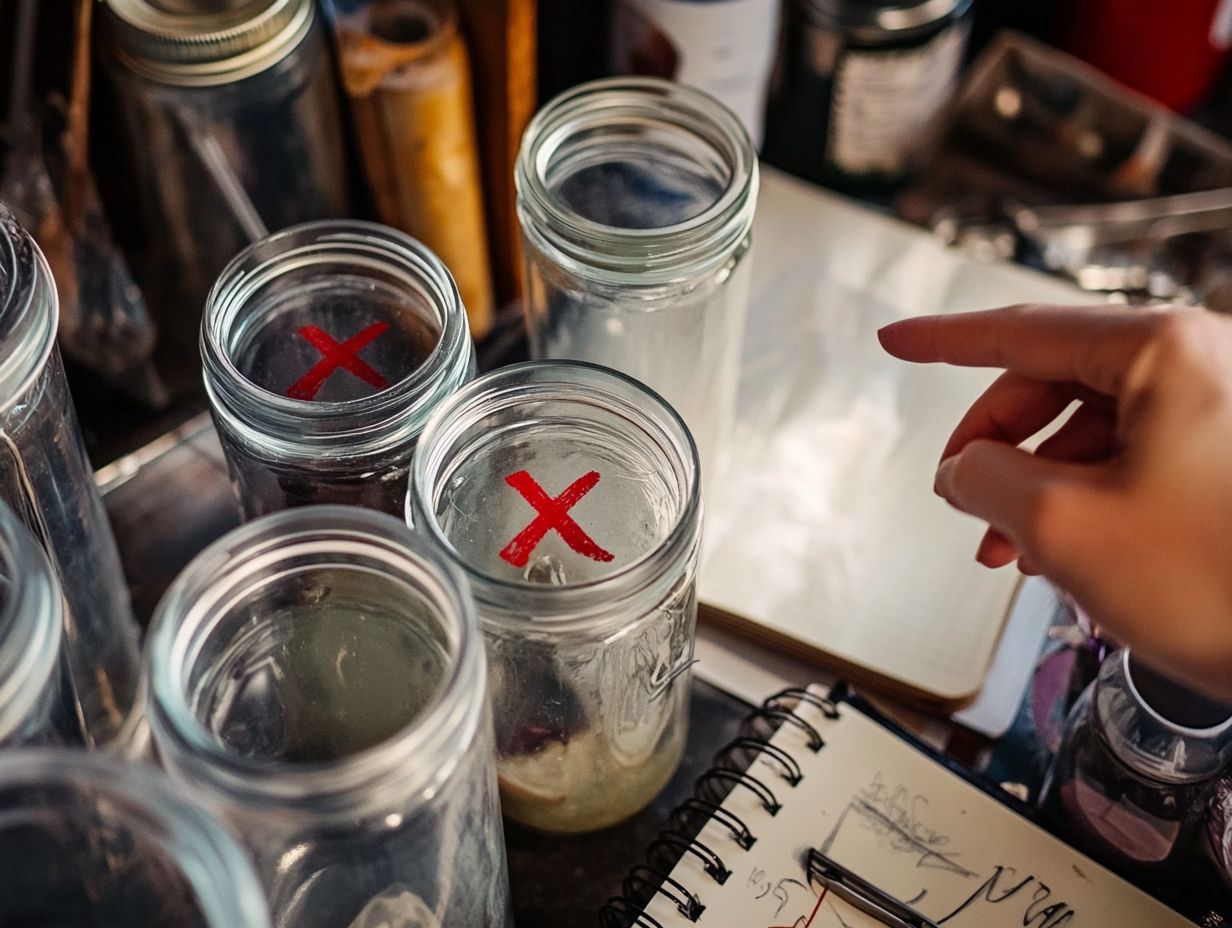
- Choose your canning materials carefully to ensure canned food safety and quality.
- Avoid using potentially harmful substances such as lead, copper, and galvanized metal in canning, as these can lead to dangerous canning methods.
- Use safe materials like stainless steel, enameled cast iron, and BPA-free plastics for canning, which are essential for effective food preservation.
Impact on Food Safety and Quality
Choosing the right materials for canning has a profound impact on food safety and the quality of your preserved items. Improper techniques can lead to food contamination and spoilage. It also heightens the risk of botulism.
Understanding the acidity levels of your foods is crucial. High acid foods like tomatoes and pickles have a lower pH that naturally wards off harmful bacteria. This makes them safer and easier to can using boiling water methods.
On the other hand, low acid foods, such as meats and vegetables, require pressure canning. Their neutral pH creates a welcoming environment for Clostridium botulinum, the sneaky bacteria behind botulism. It s essential to use glass jars specifically designed for canning; they provide a reliable seal that maintains a vacuum and keeps contaminants at bay.
Adding lemon juice or vinegar can significantly reduce risks, especially with low acid foods. Staying updated with the latest guidelines from reputable sources is your best bet for ensuring that your home canning practices are not only safe but also effective.
Materials to Avoid in Canning
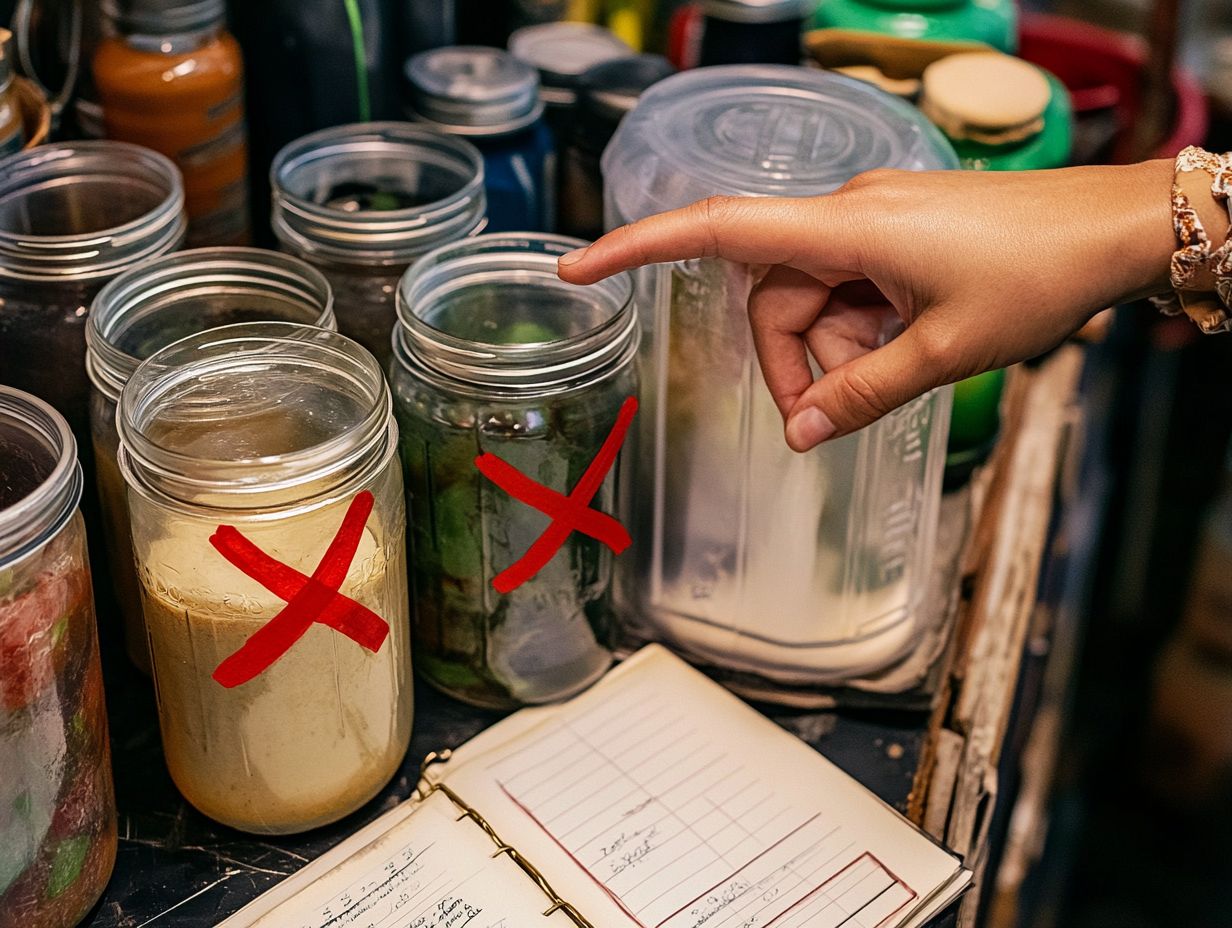
Avoiding specific materials in the canning process is just as vital as choosing the right ones. Using potentially harmful substances or risky canning methods can put the safety of your preserved foods at serious risk and lead to spoilage.
Materials like old or damaged canning jars, non-approved lids, and improper sealing techniques can invite bacteria, such as Clostridium botulinum, into your home-canned creations. Knowing what to steer clear of is essential for maintaining canning safety and ensuring that your preserved items remain safe and delicious for consumption over the long haul.
Potentially Harmful Substances
Certain substances present notable risks when it comes to canning, especially those that may harbor bacteria or toxins, with botulism being the most alarming. Clostridium botulinum, a bacteria notorious for producing toxins in anaerobic conditions, can flourish in improperly canned low-acid foods, resulting in severe foodborne botulism.
Understanding the potential sources of contamination during the canning process is essential for ensuring the safety of your home-canned foods and preventing harmful health effects. Common sources of contamination include inadequate sterilization, using cracked or improperly sealed jars, and relying on foods that are not fresh or are beginning to spoil.
Low-acid foods, such as green beans and corn, are particularly susceptible and must be processed with a pressure canner (a special pot that uses steam pressure to safely preserve low-acid foods) to ensure safety.
- Thoroughly wash all produce
- Ensure jars and lids are sterilized
- Strictly follow recommended processing times and temperatures
By maintaining these standards, you can significantly reduce the risk of contamination and safeguard yourself and your family from potential health hazards associated with unsafe canning practices.
Safe Alternatives for Canning
In terms of canning, choosing safe alternatives is crucial for maintaining the integrity and quality of your preserved foods. By utilizing recommended materials and trusted brands, you can significantly enhance the safety of your canning process.
Following established canning guidelines and selecting reliable recipes will help you effectively minimize the risks associated with unsafe canning methods and potential contamination. Prioritizing safety in food preservation ensures that the items in your pantry remain both safe and enjoyable long after the canning is done.
Start canning safely today to enjoy delicious foods all year round!
Recommended Materials and Brands
Utilizing good canning tools and trusted brands is crucial for ensuring safe canning practices. It helps in successfully preserving your foods. Resources from reputable organizations like the National Center for Home Food Preservation and classic guides such as the Ball Blue Book are essential for anyone serious about canning.
These guides help you choose the right equipment. They also highlight the significance of using specific jars, like the well-respected Ball and Kerr jars, celebrated for their durability and reliable seals.
By opting for new lids from trusted manufacturers, you can prevent contamination and achieve an airtight seal, which is vital for safe preservation.
For low-acid foods, investing in a reputable pressure canner from brands like Presto or All American is highly recommended. A proper water bath canner is a must for jams and pickles.
By following these established guidelines, you can confidently preserve your foods get ready for delicious results!
Proper Handling and Storage of Canned Goods
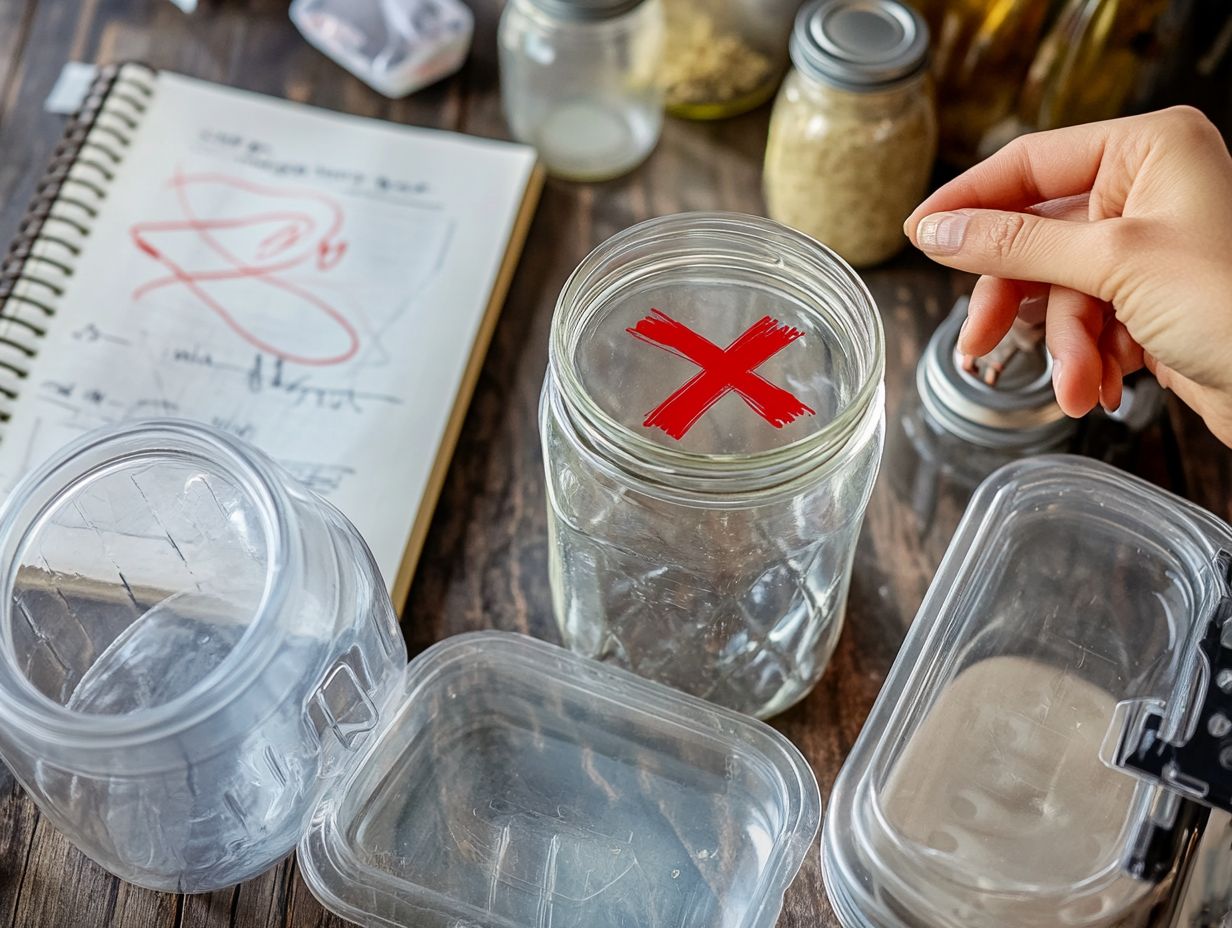
Proper handling and storage of canned goods are essential for maintaining food safety. This ensures that your home-canned foods stand the test of time, especially regarding pantry storage.
By understanding the optimal conditions for pantry storage, you can effectively prevent spoilage and contamination.
Adhering to proper canning instructions and employing the right techniques for sealing and storing your jars will significantly enhance food safety. This allows you to relish your preserved items long after the canning process.
It’s crucial to keep an eye on storage conditions and remain vigilant for any signs of spoilage to guarantee safe consumption.
Tips for Maintaining Food Safety
Maintaining food safety during the canning process is crucial. You must adhere to strict kitchen safety protocols and practical tips that effectively prevent food spoilage. These measures are essential for ensuring that your home-canned foods are safe to consume.
Before embarking on your canning adventure, you should thoroughly clean your workspace. Make sure that all equipment jars and lids included are properly sanitized. This foundational step significantly reduces the risk of contaminants that could lead to spoilage, ensuring the integrity of your canned foods.
Monitoring the pH level of the foods you re canning is also important. This measures the acidity of food, which is important for safety and helps prevent harmful bacteria from taking hold.
Don t forget to label your sealed jars with the canning date and the type of contents. This simple practice facilitates efficient rotation and ensures that older preserves are consumed first, supporting safe preservation methods in your home.
Regularly checking for signs of spoilage or compromised seals is a crucial part of food safety. By addressing any concerns promptly, you can enjoy the fruits of your labor with confidence.
Frequently Asked Questions
What materials should I avoid in canning?
It’s important to avoid using certain materials when home canning to prevent potential health hazards. This includes:
- Plastic containers – Plastic can release harmful chemicals into the food when heated, so it is best to avoid using them for safe preservation methods.
- Aluminum containers – Similar to plastic, aluminum can also react with the food and cause contamination.
- Non-food grade metal cans – These cans are not intended for use with food and can contain lead or other harmful substances, posing risks of food contamination.
Can I reuse glass jars for canning?
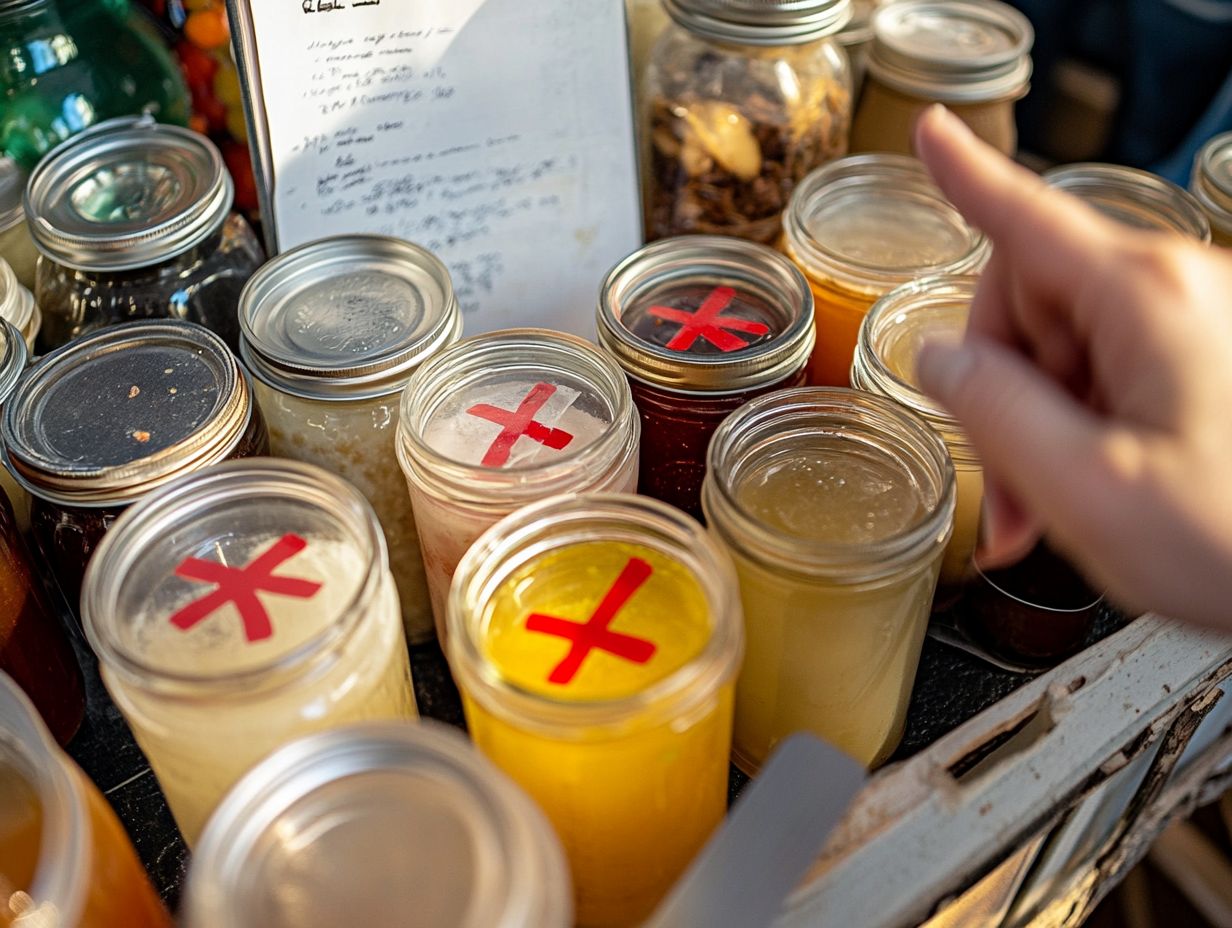
While glass jars are generally safe for canning, it is important to only reuse them if they are specifically designed for canning and have not been damaged. Using regular glass jars, such as those used for store-bought products, can lead to breakage and contamination. This can also contribute to foodborne botulism.
Now you know what to avoid let’s get started on your canning journey!
Is it safe to use wax seals for canning?
Wax seals are a charming touch, but they shouldn’t be used for canning! They don’t create an airtight seal, which can lead to dangerous bacteria and food spoilage.
Are plastic storage bags safe for canning?
Think twice before using plastic storage bags for canning! They simply can’t handle the high temperatures needed to safely preserve your delicious foods.
Can I use regular kitchen utensils for canning?
Use utensils designed specifically for canning, like a canning funnel and jar lifter. Regular kitchen utensils may not be heat-resistant and can lead to accidents.
Are there any special precautions for canning acidic foods?
When canning acidic foods, like fruits and tomatoes, use non-reactive materials such as stainless steel or enamelware. These materials prevent the acid from reacting with the container. Avoid aluminum, copper, and iron containers as they can react with the acid.
